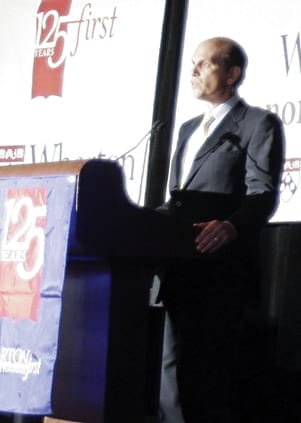 “Here’s a new realization in medical research that things need to be done quickly, and that they can be done quickly.” This realization didn’t come from researchers, but from a businessman—Michael Milken. Milken advocates the use of financial innovation as the means to solve such global challenges as climate change and poverty, as well as disease—big problems that may be more effectively addressed with the power of capital markets than with philanthropy or government mandates alone.
“Here’s a new realization in medical research that things need to be done quickly, and that they can be done quickly.” This realization didn’t come from researchers, but from a businessman—Michael Milken. Milken advocates the use of financial innovation as the means to solve such global challenges as climate change and poverty, as well as disease—big problems that may be more effectively addressed with the power of capital markets than with philanthropy or government mandates alone.
More than 35 years ago, philanthropist, financier, and Wharton School alumnus Milken began applying the innovations he developed during his studies at Wharton to revolutionize modern capital markets through the introduction of high yield bonds (also known as junk bonds) and more than 50 other financial instruments.
The financing markets continue to bear his imprint. An editor of Harvard Business Review later wrote, “Much of the strength and resilience of the economy today—including its ability to rebound in times of adversity—is due to the way people using Milken’s financing vehicles remade ailing companies or put their entrepreneurial zeal to work … Milken created a tremendous pool of liquidity and guided its use with surgical precision.” Yet Milken became a magnet for controversy in the late 1980s. A laudatory November 2004 Fortune story claimed, “Not since the days of J.P. Morgan had any financier left so deep a mark on corporate America or stirred so many conflicting passions.…”
Just a few years after starting in business, Milken started to engage his business innovations in philanthropy. Today he is ranked not only as one of the leading economic innovators in the United States, but also as one of the most generous living Americans.
During the past 30 years, he and his family have given more than $750 million to medical research and education. Their Milken Family Foundation has created models in how philanthropy can advance education, youth programs, inner-city solutions, pediatric neurology, and treatments for various forms of cancer. Other endeavors include the Milken Institute, a non-partisan economic think tank; the Prostate Cancer Foundation, the world’s largest philanthropic source of funds for prostate cancer research; and Faster-Cures, an “action tank” dedicated to removing the barriers that slow the discovery and development of new medical solutions.
The 2004 Fortune profile, which dubbed Milken “The Man Who Changed Medicine,” reported that in the fight against prostate cancer he “has energized the medical establishment in a quest for a cure. Now thousands of men are living longer—and leaders everywhere are taking notice.”

























